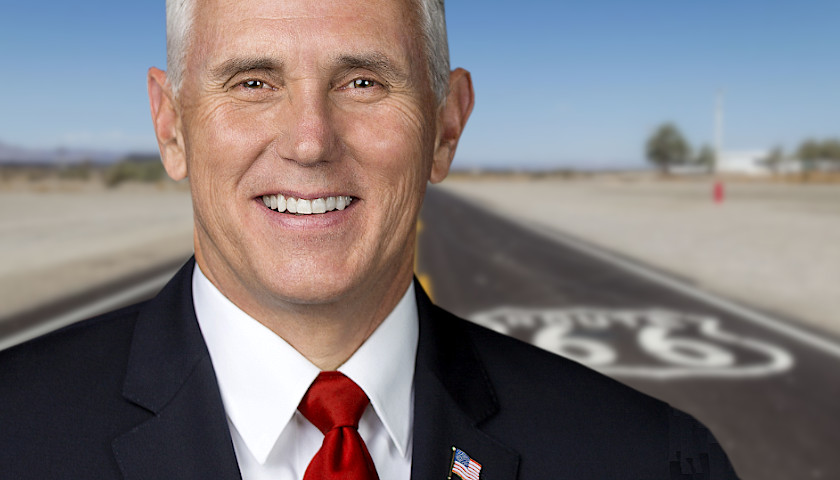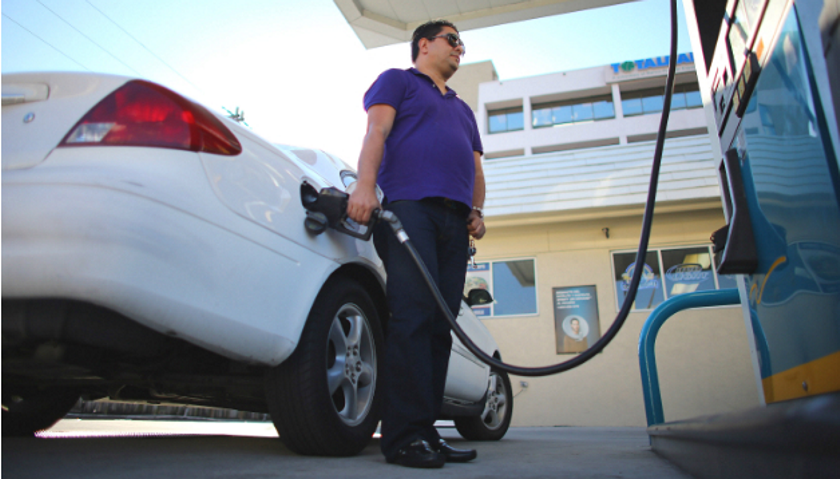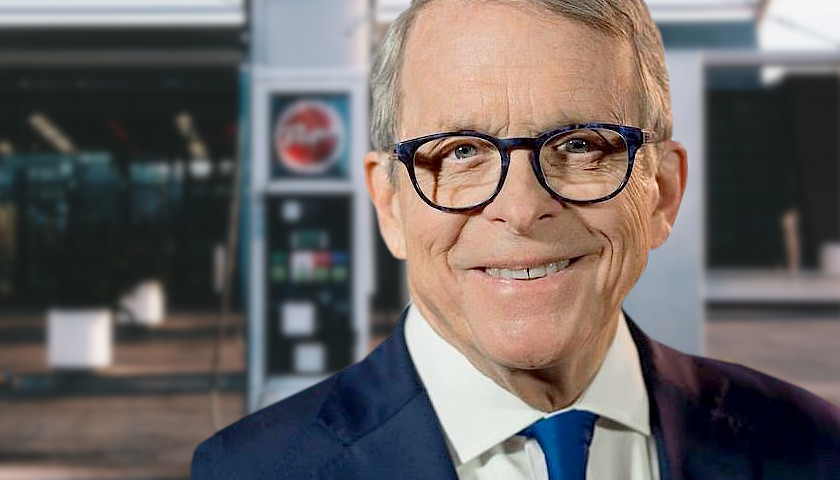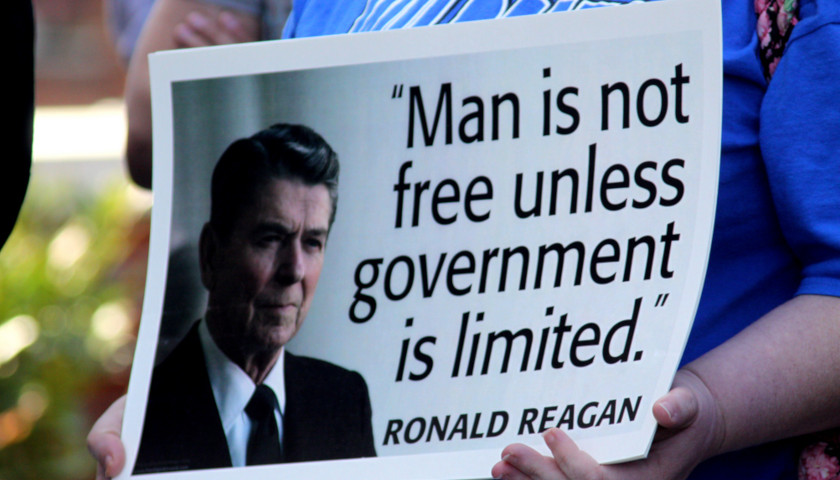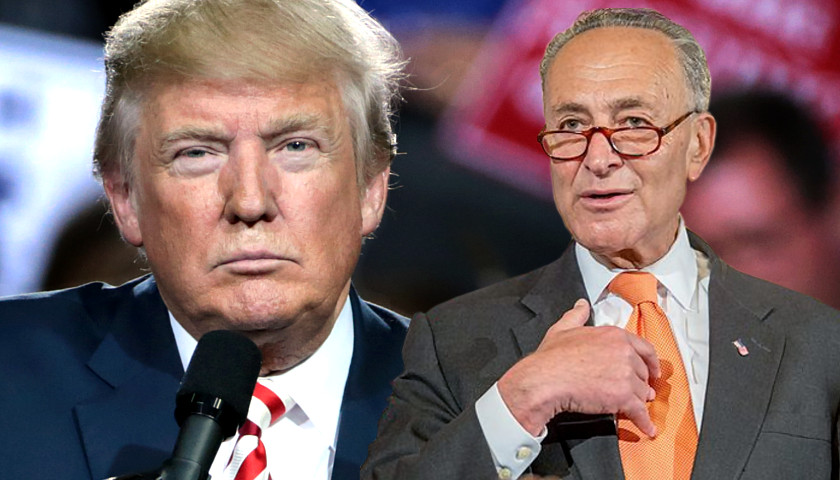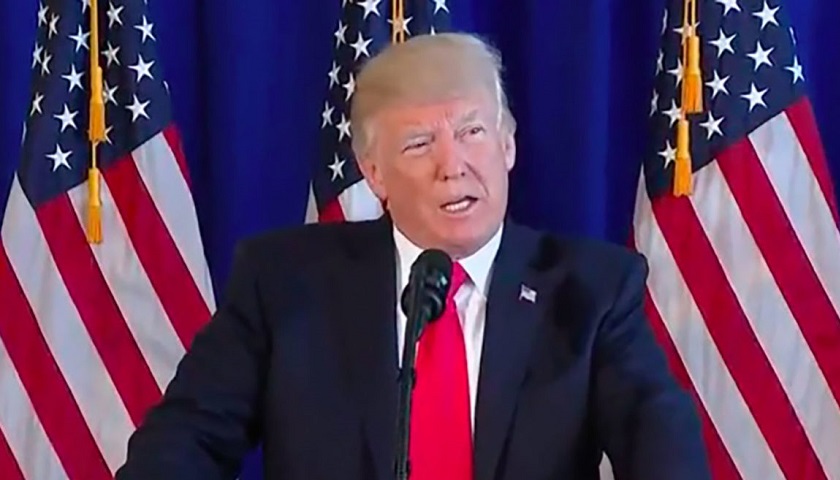by Fred Lucas Vice President Mike Pence on Friday told a gathering of state governors that the Trump administration is working with Congress on what he called a “historic” infrastructure program that would both reduce red tape and provide more federal funding. Addressing the governors at the vice presidential residence at the Naval Observatory in Washington, Pence did not specify a price tag for the infrastructure plan. “I’ll make you a promise, and we’ll ask for your help, that in this Congress, we’re going to pass historic infrastructure legislation,” he said. During the 2016 presidential campaign, then-candidate Donald Trump called for an infrastructure plan of about $1 trillion that would include public and private funding. Such a project should not be a heavy burden on taxpayers, said Paul Winfree, director of economic policy at The Heritage Foundation. “If the Trump administration wants a legacy moment on infrastructure, it must include regulatory improvements that have long-lasting impacts on the way we build everything, from roads and bridges to pipelines and ports,” Winfree told The Daily Signal. The Heritage Foundation earlier this month issued a report calling regulatory reform a key element of future infrastructure projects. “Unleashing the private sector and…
Read the full storyTag: Infrastructure
Ohio Department Of Transportation Introduces Comprehensive Gas Tax that Could Increase Every Year
Friday, Ohio Department of Transportation Director Jack Marchbanks formally introduced the proposed 2020-21 Biennial Budget. House Bill 62 (HB 62), the budget’s formal designation, includes an 18-cent gas tax increase. While lower than some reports have suggested, the proposed tax will give Ohio one of the highest gas tax rates in the country. In addition, it contains a provision that could raise gas taxes even higher in the coming years. The 18 cent tax would go into effect immediately upon passage. When measured against other states, this is an exceptionally aggressive approach. When Nebraska voted to raise its takes, it did so in increments of 1.6 cents per year. A more incremental approach could ensure Ohioans don’t face “sticker shock” at the pump. The bill would also tie the gas tax rate to the Consumer Price Index (CPI). At the start of every fiscal year, the tax will be reexamined and if the CPI has increased, the tax will increase with it. While it would ensure that road repair is adequately funded, there is a significant drawback. As written, the law does not stipulate that the gas tax would decrease, should the CPI decrease. if the Ohio economy faces a sudden hardship or enters a recession, Ohioans would…
Read the full storyOhio Governor DeWine to Announce Gas Tax Hike
At an annual forum sponsored by the Associated Press, Ohio Republican Gov. Mike DeWine announced Wednesday he intends to formally recommend raising the current gas tax. The recommendation will come as he introduces his first two-year transportation budget Friday. Despite appointing an Advisory Committee on Transportation Infrastructure Issues specifically to explore alternative solutions to simply raising the gas tax, the governor made it clear he felt there was no real alternative. He did make a point to say the hike is “just to keep us where we are today and with the ability to do some safety projects that absolutely need to be done.” It can be inferred from this statement that his intention is to raise the gas tax enough to not let the state’s road and bridge repair funding deficit get worse than it currently is. This suggests that the tax hike would be more modest relative to addressing the full scope of road and bridge repair needed in Ohio. Currently, there is a $1 billion gap in funding. The current state tax on gas in Ohio is 28 cents per gallon. However, when combined with federal and local taxes, the total amount climbs to just about 46.5 cents per gallon.…
Read the full storyGovernor DeWine Accelerates Gas Tax Planning with No Limits Set
It’s safe to say that when Ohio Governor Mike DeWine appointed his “Governor’s Advisory Committee on Transportation” to develop solutions for paying for road and bridge repairs, citizens were hoping they’d come up was some creative answers. Instead, the committee reached a consensus last week that the primary means by which road repairs would need to be funded would be through raising gas taxes. During a meeting with the Canton Repository Editorial Board, Governor DeWine made it clear that he would be taking their advice. He noted that not only was raising the gas taxes essential to fixing the problem but that he couldn’t put a number on how high the hike would be. When asked how much the raise could be per gallon, he stated: Well I’m not going to talk about it yet. I’m not going to put a number on it…Just to maintain status quo, we’ve got to come up with $1.5 billion a year. So how we do that? I’ve been in discussions with the members of the leadership of the legislature of how to do that. Just doing the numbers, significant amount of that has to come from the gas tax. Many advocates note that there will never…
Read the full storyDeWine Appointed Committee Recommends Gas Tax Hike for Ohio
After two meetings and two hours of public testimony, the Governor’s Advisory Committee on Transportation has, so far, agreed on only one thing to save Ohio’s roads and bridges: raise taxes. As previously reported, the committee was officially launched on January 31st. Hand-picked by Governor Mike DeWine, the bipartisan committee of industry leaders, advisers, and infrastructure experts was assigned the review the current infrastructure needs and explore creative and unique solutions. While they have yet to make their final report, these initial findings are sure to disappoint many of DeWine’s voters, should they be adopted. The current gas tax was set at 28-cents-a-gallon on July 1st, 2005. These revenues are intended to directly fund the maintenance, repair, and expansion of roads and bridges throughout the state. Over time, two primary factors have greatly diminished their ability to do so. The first is that, as cars have become more efficient and achieve higher miles-per-gallon, revenues have decreased. In addition, the higher demand and proliferation of electric vehicles has had an effect that will significantly increase over time. Until this problem is addressed, the more ubiquitous electric cars become, the harder it is to maintain the roads all drivers use. The second factor is…
Read the full storyFormer Congressman Jim Renacci Set to Launch ‘Ohio’s Future Foundation,’ a Non-Profit Focused on ‘Ohio First’ Policies
Former Congressman Jim Renacci, of Ohio’s 16th district, has announced that he will chair a new organization aimed at advancing Ohio forward. The group is called Ohio’s Future Foundation. Their goal, according to their announcement package is to launch “large scale and highly targeted voter education and advocacy campaign(s)” that are intended to marshall public support for their key goals; “vocational education, energy growth advocacy, municipal income tax reform, healthcare reform, and infrastructure funding.” These issues, though diverse, are all key areas that are desperately underserved in Ohio. Skilled labor represents some of the most well paying and secure jobs in America that don’t require a college education. However, after years of diminishing vocational training in k-12 education (in favor of focusing on college attendance), there is a well documented “Skilled Labor Gap” in America. In states like Ohio, that skilled labor gap hits the hardest. Many state industry leaders feel note that a lack of skilled labor os one of the leading causes of Ohio’s failure to keep up with the economic growth of the country. Ohio’s Future Foundation aims to counter this with a twofold approach. Their first aim is to remove the stigma often associated with vocational training, presumably through a…
Read the full storyCommentary: America’s Success Was Not Achieved by Government, But by Limiting Government
by Gary Galles Then-President Obama’s famous 2012 “you didn’t build that” rationalization for not only increasing taxes but also for increasingly progressive taxes has returned to public consciousness. Cato policy analyst Derek Bonett has focused attention back on the logic of his argument, as well as reminded us that Obama was channeling a 2011 campaign speech by 2020 presidential hopeful Elizabeth Warren. And David Henderson has spread the word about that thought process, which was shared among self-designated progressives. The thrust of the counter-argument they offer is that differing earnings across people cannot be explained by differential public goods consumption (e.g., road use) and so cannot justify taxation that is proportional to income, much less progressive. And the case is airtight. However, there are many more, perhaps even more important, reasons for that justification failure. Voluntary Arrangements The first error is mistakenly equating society with government. That our society contributes to people’s successes does not imply the successful owe more taxes to government. As Albert Jay Nock noted, it is commonly true that “the interests of the state and the interests of society…are directly opposed.” Very few of government’s actions improve our ability to voluntarily cooperate, advancing our general welfare, from what would…
Read the full storyChuck Schumer Demands Climate Concessions From Trump on Infrastructure Spending
by Michael Bastach Senate Minority Leader Chuck Schumer told President Donald Trump that Democrats won’t cut a deal with him on infrastructure spending unless it includes a slew of policies aimed at fighting global warming. Schumer, the Senate’s top Democrat, called for, among other things, making green energy and electric vehicle tax credits permanent, more research funding into green technology and funding to harden infrastructure against extreme weather. “The impacts will continue to worsen if we do not take decisive and immediate action to transition to a 100-percent clean energy economy,” Schumer wrote in a letter to Trump sent Thursday. Both Trump and Democrats proposed $1 trillion infrastructure packages, but Democrats also want to make an infrastructure build-up about fighting global warming. “A single infrastructure bill will not solve our climate problem in its entirety, but it is an important first step,” Schumer wrote to Trump, also giving a list of demands for any infrastructure plan. Schumer’s letter, and accompanying Washington Post op-ed, come as Democrats push for global warming to become a central focus of 2019. A small, but growing, cadre of Democrats led by Rep.-elect Alexandria Ocasio-Cortez of New York want “Green New Deal” legislation to rapidly force the U.S. to use…
Read the full storyCyber Infrastructure Gets a Boost by Congress
by Natalia Castro In the last year, both chambers of Congress have been working hard to improve our nation’s cyber security and cyber infrastructure. Last week, the Senate passed landmark legislation that will modernize U.S. cyber technology to combat growing threats around the world. On Oct. 4, 2018, the Senate passed the Cyber security and Infrastructure Security Agency Act of 2018 which passed the House in December 2017 when it was introduced by Texas Republican Rep. Michael McCaul. In the Senate it passed by unanimous consent and in the House by voice vote due to its widespread support. The Act reorganizes the Department of Homeland Security’s (DHS) main cyber security unit, the National Protection and Programs Directorate, to the Cyber security and Infrastructure Protection Agency. Under the law, this group will now function more like FEMA or the Secret Service instead of a small internal DHS office. Department of Homeland Security Secretary Kirstjen Nielsen noted in an interview with the Washington Post, “We are responsible for federal efforts when it comes to both protecting critical infrastructure, working with the owner-operators in private sector, and protecting all those civilian dot govs. To do that, we have to have both a name that indicates…
Read the full storyTrump to Unveil $1.5 Trillion Infrastructure Plan
Donald Trump’s administration will sketch out more details of its plan to invest in America’s creaking infrastructure Monday, hoping it can leverage up to $1.5 trillion for the cause. Senior White House officials said the president’s budget, due to be released on Monday, will include $200 billion earmarked for projects to fix roads, bridges and other crucial infrastructure.
Read the full storyDoes State Of The Union Address Indicate Bad News For Nashville Transit Funding?
President Donald Trump is expected to announce in tonight’s State of the Union address $200 billion in federal funding for infrastructure and other projects. But one PAC that opposes Nashville’s transit plan says that is not necessarily good news for Mayor Megan Barry. Politico reports the president had promised a $1 trillion, 10-year blueprint to rebuild American roads, railroads, bridges and airports. State, local and private investors would have to cough up more money than normally would be the case under the president’s proposal. “Instead of the grand, New Deal-style public works program that Trump’s eye-popping price tag implies, Democratic lawmakers and mayors fear the plan would set up a vicious, zero-sum scramble for a relatively meager amount of federal cash — while forcing cities and states to scrounge up more of their own money, bringing a surge of privately financed toll roads, and shredding regulations in the name of building projects faster,” Politico says. The administration says $200 billion is not a large amount for such a plan but adds it would draw state, local and private funds. In addition to land transportation infrastructure, identified possible projects include rural broadband service, veterans hospitals and commercial spaceflight. The White House is…
Read the full storyDonald Trump Will Announce Plans to Privatize Air-Traffic Control, Boost Infrastructure Spending
President Trump will begin a push Monday to privatize the air traffic control system, according to White House officials, as he pivots next week to an ambitious plan to rebuilt America’s highways, bridges, seaports and airports. The bold move to dislodge air traffic control (ATC) from the Federal Aviation Administration and create a quasi-independent, non-profit corporation…
Read the full story
